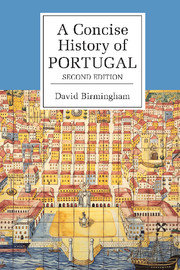Book contents
- Frontmatter
- Dedication
- Contents
- List of illustrations
- Introduction
- 1 Peoples, cultures and colonies
- 2 Rebellion and independence in the seventeenth century
- 3 The golden age and the earthquake in the eighteenth century
- 4 Brazilian independence and the Portuguese Revolution
- 5 The bourgeois monarchy and the republicans
- 6 The dictatorship and the African empire
- 7 Democracy and the European Community
- The houses of Avis, Beja and Habsburg
- The houses of Braganza and Braganza-Saxe-coburg
- Republican presidents
- Select source materials
- Selected works published since 1990
- Further reading in English
- Index
4 - Brazilian independence and the Portuguese Revolution
Published online by Cambridge University Press: 05 June 2014
- Frontmatter
- Dedication
- Contents
- List of illustrations
- Introduction
- 1 Peoples, cultures and colonies
- 2 Rebellion and independence in the seventeenth century
- 3 The golden age and the earthquake in the eighteenth century
- 4 Brazilian independence and the Portuguese Revolution
- 5 The bourgeois monarchy and the republicans
- 6 The dictatorship and the African empire
- 7 Democracy and the European Community
- The houses of Avis, Beja and Habsburg
- The houses of Braganza and Braganza-Saxe-coburg
- Republican presidents
- Select source materials
- Selected works published since 1990
- Further reading in English
- Index
Summary
In 1807 the imperial army of France entered Portugal led by General Junot, one of Napoleon's favourite officers and his former ambassador at the Braganza court. Before the invaders reached Lisbon the royal family and numerous courtiers and camp-followers were evacuated by the British navy and taken for safe keeping to Brazil. The Lisbon bourgeoisie, and those sections of the nobility which remained behind, sensibly welcomed the French who ruled the city for some months before being driven out by a British expeditionary force. Further French and British invasions seriously impoverished the country and culminated in the establishment of a British military authority commanded by Viscount Beresford. The Portuguese royal family remained in Brazil and signed an Anglo-Portuguese treaty in 1810 which superseded the Methuen Treaty of 1703 and recognised direct access to Brazil by British traders, thus accelerating the drift towards Brazilian political independence. Ten years later restiveness at British military overrule in Portugal led to the outbreak of the Portuguese Revolution of 1820. This French-style revolution lasted intermittently for thirty-one years and only after the turbulence of civil war, terror, anti-clericalism and dictatorship, did the country settle to a constitutional monarchy closely linked to Victorian England. Brazil meanwhile broke away politically from Portugal in 1822 to become an autonomous ‘empire’ ruled by a Latin Americanised branch of the Braganza royal house.
- Type
- Chapter
- Information
- A Concise History of Portugal , pp. 99 - 130Publisher: Cambridge University PressPrint publication year: 2003

